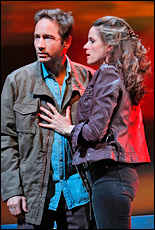SITE GUIDE
SEARCH
REVIEWS
REVIEW ARCHIVES
ADVERTISING AT CURTAINUP
FEATURES
NEWS
Etcetera and
Short Term Listings
LISTINGS
Broadway
Off-Broadway
NYC Restaurants
BOOKS and CDs
OTHER PLACES
Berkshires
London
California
New Jersey
DC
Connecticut
Philadelphia
Elsewhere
QUOTES
TKTS
PLAYWRIGHTS' ALBUMS
LETTERS TO EDITOR
FILM
LINKS
MISCELLANEOUS
Free Updates
Masthead
A CurtainUp Review
The Break of Noon
By Elyse Sommer
|
. . . I am trying to understand God. That’s all. What he wants me to do! — John Oh boy. You’re not honestly gonna keep going out there, I mean, in public. . ..and saying that, are you? About God?— Ginger Yes--maybe! What would be wrong about it if I did? Huh? — John About a million things. Maybe more. And frankly, it all seems pretty convenient for you, now that you’re this . . .Now you need a wife and kid to prove you’re this big ‘family man.’ — Ginger |

David Duchovny and Amanda Peet (Photo: Joan Marcus )
|
In John Smith, a very much new to religious faith as well as just being a good guy (that's good, as in being an honest, f aithful, financially responsible husband), Mr. LaBute has written a terrific role for film and TV actor David Duchovny's stage debut. Duchovny is a persuasive addition to LaBute's gallery of less than admirable modern middle class men.
John certainly has a history to to make salvation and what it implies in terms of making a fresh start desirable. But, as more of that past history is revealed, it becomes easier and easier to believe that the man we are watching might be more appallingly self-serving than appealingly touched by a redemptive spirit.
As you listen to John's information and emotion packed opening monologue (a LaBute specialty) you're tempted to believe that the LaButian catalogue will finally include a hero rather than an anti-hero. This lengthy opening is actually John's statement to the police just after the shootout. So. . . is he going to have second thoughts about that statement about being saved by God's intercedence? Does he admit that his vision of God was the result of being traumatized and slightly crazed by being caught up in violence he heretofore viewed as the stuff of horror movies? Not this John. He insists that he saw what he saw, heard what he heard. In short, he remains focused on using his otherworldly salvation to turn his life around and do the same for others.
But as each of the five scenes that follow the opening seems to fortify John's determination, for LaButians used to this playwright's dark view of humankind generally, and men in particular, bits of dialogue in each can be construed as more question marks pertaining to the veracity of John's story and the selflessness of his actions. Being the clever writer he is, LaBute also uses each of these encounters to actually steer John towards the next step in his post-traumatic journey to a more meaningful life.
John s first encounter is with a lawyer (John Earl Jelks, who reappears in the penultimate scene as a hard nosed detective). The purpose of the visit is to see what to do with a picture John took of one of the victims in a moment of crisis which he probably should have turned over to the police but seems to think might be his ticket for following up on his pledge to God to do good. John's come to the right place. The lawyer immediately recognizes the monetary value in the picture . (". . . very brave stuff. What you did. You’re like goddamn Robert Capa!") He doesn't care whether John follows up on his declared aim to use any money that picture will yield to benefit others but it's clear that he knows his business since the action next segues to John being interviewed by TV talk show host Jenny Claflin (Tracee Chimo).
The next scenes are of a more personal nature. The first is a meeting with John's ex-wife Ginger (Amanda Peet) who's got too many bad memories to believe his transformation and suspects his wanting to get together again as a scheme to enhance his newfound status as a spiritual do-gooder. Ginger's 's unwillingness to buy into this new John is confirmed by his next meeting with Jesse (Peet again), Ginger's cousin with whom he had a long-standing affair. Jesse is more inclined to be impressed with his face-to-face with God, but she's not willing to have their affair made part of a public faith-inspired mea culpa.
The 90 minute play concludes as it began, with a monologue by Duchovny who, since he's in every scene, is the only one the 4-member cast not playing two roles. Before that final monologue there's also a fantastical scene in a hotel room with a sex worker named Gigi (Chimo again) and a more threatening encounter with Jelks as the already mentioned cold-case minded detective.
While everything revolves around Duchovny, the three other actors are superb, with the women especially impressive in differentiating their characters. Amanda Peet, who also appeared in LaBute's This is How It Goes no sooner wows us as John's cynical ex-wife, than she reappears as his mistress. Tracee Chimo, who was such a riot as the awkward teenager in Annie Baker's Circle Mirror Transformation, proves to be as impressive in the more adult roles of the TV interviewer and especially as a special interest sex provider with a surprising connection to John's life changing experience. Jo Bonney who also directed Fat Pig and Some Girls at MCC, again shows her affinity for making the most of LaBute's comic but dark takes on modern mores. With the aid of a talented design team she sees to it that there is a continuously heightened awareness of how each of the people John interacts with will contribute to the John we meet in that concluding monologue — which may pepper exit talk with speculations about just which well known God-fearing spinmeisters, past and present, Mr. LaBute had in mind when he created this ordinary-turned-extraordinary Everyman.
Links to some other Neil LaBute productions reviewed at Curtainup:
Bash in London
The Distance From Here in London & New York and and in the Berkshires
Fat Pig
Some Girl(s) in London and New York
This Is How It Goes
Wrecks
|
The Break of Noon by Neil LaBute Directed by Jo Bonney Cast: Tracee Chimo (Jenny/Gigi), David Duchovny (John Smith), John Earl Jelks (Lawyer/Detective) and Amanda Peet (Ginger/Jesse). Sets: Nel Patel Costumes: ESosa Lighting: David Weiner Sound: Darron L. West Original Music: Justin Ellington Special Effects: Matthew Holtzclaw Dialect Coach: Stephen Gabis Wig Design: J. Jared Janas & Rob Greene Stage Manager: Christina Lowe From 10/28/10; opening 11/22/10; closing 12/12/10. Running Time: 90 minutes without an intermission MCC co-production with Geffen Playhouse at the Lucille Lortel Theatre 121 Christopher Street 212-279-4200 Tuesdays and Wednesdays at 7:00 p.m., Thursdays and Fridays at 8:00 p.m., Saturdays at 2:00 & 8:00 p.m. and Sundays at 3:00 & 7:30 p.m. Reviewed by Elyse Sommer at 11/19/10 press preview |
|
REVIEW FEEDBACK Highlight one of the responses below and click "copy" or"CTRL+C"
Paste the highlighted text into the subject line (CTRL+ V): Feel free to add detailed comments in the body of the email. . .also the names and emails of any friends to whom you'd like us to forward a copy of this review. Visit Curtainup's Blog Annex For a feed to reviews and features as they are posted add http://curtainupnewlinks.blogspot.com to your reader Curtainup at Facebook . . . Curtainup at Twitter Subscribe to our FREE email updates: E-mail: esommer@curtainup.comesommer@curtainup.com put SUBSCRIBE CURTAINUP EMAIL UPDATE in the subject line and your full name and email address in the body of the message. If you can spare a minute, tell us how you came to CurtainUp and from what part of the country. |

Slings & Arrows-the complete set
You don't have to be a Shakespeare aficionado to love all 21 episodes of this hilarious and moving Canadian TV series about a fictional Shakespeare Company






